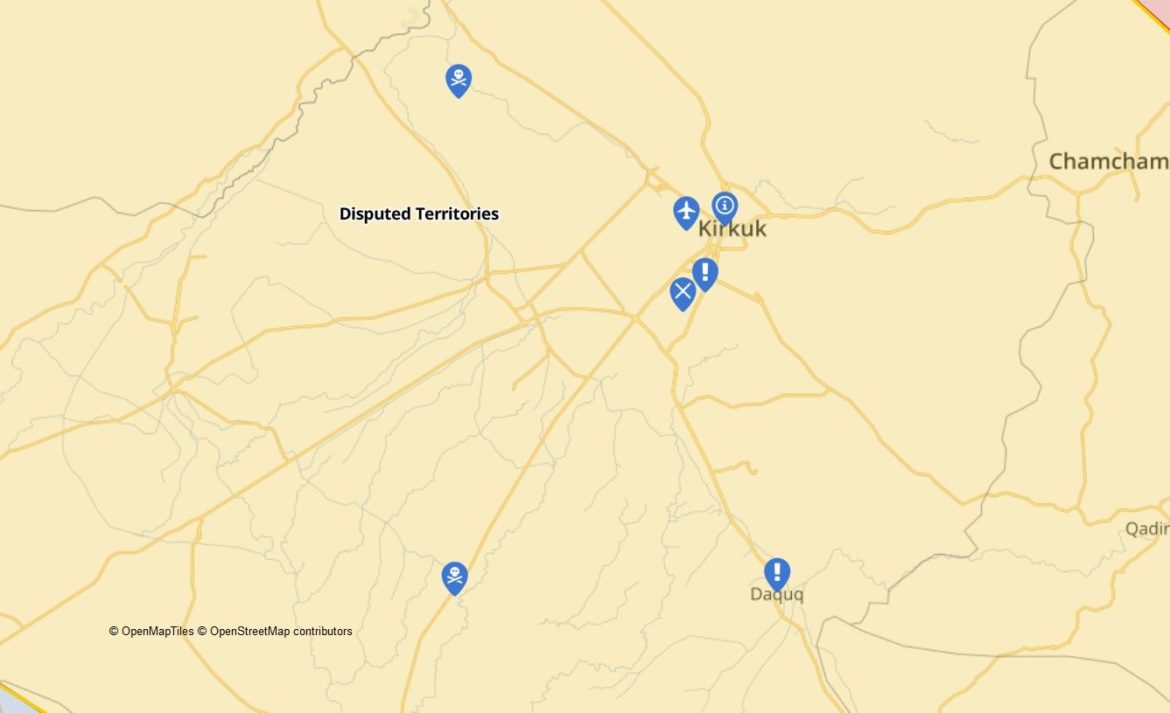936
Kirkuk
- In a new wave of Arabization, the Kirkuk court ruled in favor of the Arab settlers, taking 3,000 Dunams (741 acres) of agricultural land from the native Kurds near Daquq district. The lands will be confiscated from Kurds and given to Arabs, in a continuing of the Arabization policies of the Ba’ath party regime. Separately, newly leaked documents of the Kirkuk administration uncovered the transferring the identification cards of 100-200 families from the Hawija district and its villages, to Kirkuk city, in an attempt to increase the Arab population in the Kurdish province.
- Kirkuk continues as the worst province at providing electricity to its citizens. According to the newest statistics released by the Ministry of Electricity, Kirkuk is supplied with only nine and half hours a day of electricity. Recently, the acting governor, Rakan al Jabouri, and the Turkish-backed lawmaker, Arshad al Salihi, admitted Baghdad’s failure to provide basic services to Kirkuk in a rare confession. Both politicians were against the Kurdish administration who provided twenty hours of electricity before October 16, 2017.
- Public pressure from Kurdish residents obliged Kirkuk’s acting governor Rakan al Jabouri to reverse his initial decision, restricting the Kurdish celebration for Newroz to just three hours. Al Jabouri issued a second memorandum shortly after, allowing the Kurds to celebrate Newroz, but “under the supervision” of the security forces. Kurds in Kirkuk have been deprived of cultural rights, including raising the constitutionally-recognized flag of Kurdistan. Furthermore, public pressure also pushed the Iranian-backed President of Kirkuk University, Omran Jamal Hassan, to allow the commemoration of the Halabja Genocide after his initial rejection. On National Clothing Day, March 10, Hassan prevented Kurdish students from entering the campus because they wore traditional clothes. However, the university repeatedly holds memorial events for deceased Iranian leaders and their Iraqi proxies.
- On Saturday, March 10th, the Arab and Turkmen parties rallied their supporters and protested the continuation of the closure of Kirkuk’s airport despite the completion of its building. The protesters demanded the “immediate opening” of the airport for civilian aviation, a request that the federal government has rejected, citing security concerns. Kirkuk’s airport has been hit with rockets on several occasions, and due to terror attacks, the authorities remain uncommitted to opening it.
- The Integrity Commission announced the arrest of “two local officials” for corruption charges related to “occupying two parcels of government land, and using them as parking lots. The Integrity Commission did not release the names of the officials, but it estimated the land value at four billion Iraqi Dinars ( about two million USD). The land belonged to Kirkuk’s municipality and the finance ministry.
- On Monday, March 14, ISIS (Da’esh) terrorists attacked the 3rd brigade of the 19th division of the Iraqi federal police near Rashad district, killing an officer and injuring three more. Further, Iraq’s operation command announced the arrest of three Da’esh suicide bombers in Kirkuk, who traveled from Syria. The capture of the terrorists was “in cooperation” with Kurdish security forces on Wedesday. Moreover, according to Iraqi forces, four Da’esh terrorists were killed near Dibis after an airstrike was conducted on Friday, March 11th. Despite the deterioration of the security in Kirkuk since October 16, 2017, the Baghdad-Erbil agreement to establish joint military forces for the disputed territories remains unimplemented due to a lack of budget allocations.
Tuz Khurmatu
- Four years after the October 16, 2017 events, Kurdish families who lost their homes and were displaced by Iraqi forces and Iranian-backed militias are yet to receive compensation from the federal government. Dozens of families filed lawsuits against atrocities committed by Shia militants, backed by Iran. An investigative committee of the federal government has confirmed damage to the homes, but the compensation has yet to be paid.
Khanaqin
- Iraq’s Interior Minister has transferred the identification cards of dozens of non-Kurd families from Diyala’s Baquba and Khalis districts, part of the ongoing Arabization process. The leaked documents showed the fraud occurring over a three year span, 2020, 2021, and 2022.
Makhmour
- In a Da’esh attack on Iraq’s 14th army division, two Iraqi soldiers were killed, and five others were wounded near Gerda Hara village of Makhmour on Monday, March 13. Three of the soldiers were injured due to an IED explosion during the clashes. Further, an IED killed a child while he was collecting recycling cans near a waste site in Naseri village.
Shingal (Sinjar)
- On March 16th, the Nineveh Operation Command imposed a curfew on Shingal and its subdistricts and villages, starting at 10:00 pm and ending at 06:00 am. Officials didn’t issue a clarification after the decision, which stated it would continue until “further notice.” Meanwhile, tension increased between the Iraqi forces and the Shingal Resistance Units (YBS) after unknown gunmen threw two stun grenades into an army checkpoint on Monday. Iraqi troops accused the YBS of being behind the incident and have repeatedly informed the armed group to leave Sinjar.

